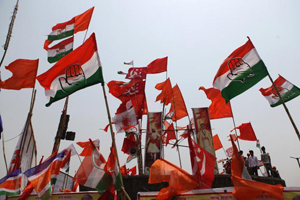New Delhi, Apr 25: Six electoral trusts together disbursed Rs 177.40 crore to 19 political parties during the fiscal 2014-15, with the BJP receiving the maximum donation of Rs 111.35 crore, as per a new report citing latest disclosures.
 The report by rights group Association for Democratic Reforms (ADR) said electoral trusts received a total amount of Rs 177.55 crore from corporates and individuals and distributed Rs 177.40 crore (99.92 per cent) to various political parties.
The report by rights group Association for Democratic Reforms (ADR) said electoral trusts received a total amount of Rs 177.55 crore from corporates and individuals and distributed Rs 177.40 crore (99.92 per cent) to various political parties.
The BJP, the INC, the NCP and the CPM were the four national parties that got contributions from the six electoral trusts during fiscal 2014-15.
The BJP was the recipient of the maximum amount of Rs 111.35 crore from three electoral trusts followed by the INC with Rs 31.65 crore from three electoral trusts.
The CPM received a total of Rs 2.35 lakh from Triumph Electoral Trust during fiscal 2014-15, but the party did not declare the same in its donations report to the Election Commission of India (ECI).
According to the rules formulated by the government, electoral trusts are required to donate 95 per cent of their total income to registered political parties in a financial year.
Electoral Trusts' sole purpose is to fund registered political parties in a transparent manner.
Satya Electoral Trust received total contribution of Rs Rs 141.78 crore while Progressive Electoral Trust got Rs 25.14 crore, Janpragati Electoral Trust (Rs 4.02 crore), Bajaj Electoral Trust (Rs 3.05 crore), Triumph Electoral Trust (Rs 3.028 crore) and Samaj Electoral Trust (Rs 0.525 crore).
Satya Electoral received the highest amount of Rs 141.78 crore from corporates and distributed Rs 141.75 crore (99.98 per cent) to various political parties.
Satya Electoral donated 75.66 per cent, or Rs 107.25 crore, to the BJP while Triumph Electoral donated 66 per cent, or Rs 2 crore, of its total income to the party.
The six electoral trusts made contributions to 15 recognised regional parties which include the BJD, the INLD and the AAP, among others.
Total donations received by the regional parties from electoral trusts was Rs 27.58 crore.
Satya Electoral gave Rs 5 crore to the INLD, but the party has not filed its donations report to the ECI for fiscal 2014-15.
Indiabulls HousingFINANCE had contributed the maximum amount of Rs 40 crore to Satya Electoral Trust, which formed 22.53 per cent of the trust's total donations followed by DLF, which donated Rs 25.01 crore and constituted 14.08 per cent of total donations.
Tata Steel contributed the maximum amount and donated Rs 14.134 crore, which formed 56.19 per cent of total donations to Progressive Electoral Trust, followed by Tata Sons, which donated Rs 4.74 crore and constituted 18.85 per cent of total donations.





Comments
Add new comment